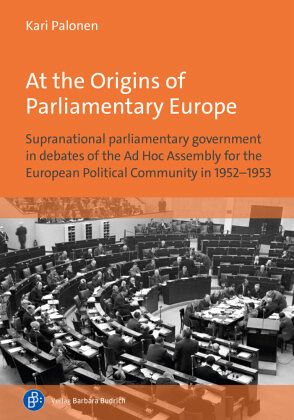
At the Origins of Parliamentary Europe
Supranational parliamentary government in debates of the Ad Hoc Assembly for the European Political Community in 1952-1953

PAYBACK Punkte
22 °P sammeln!
Im Jahr 1952 bildeten Politiker aus Deutschland, Frankreich, Belgien, Italien, den Niederlanden und Luxemburg die erste Ad-hoc-Versammlung mit dem Ziel, eine Verfassung für eine künftige europäische politische Gemeinschaft zu entwerfen. In ihren Überlegungen, wie eine parlamentarische Regierung in einer supranationalen Gemeinschaft realisiert werden könnte, formulierten die Teilnehmer zentrale Aspekte der europäischen Politisierung.Das Buch entdeckt diesen bisher vernachlässigten Ursprung des parlamentarischen Europas neu und untersucht die Bedeutung der Ad-hoc-Versammlung für die Poli...
Im Jahr 1952 bildeten Politiker aus Deutschland, Frankreich, Belgien, Italien, den Niederlanden und Luxemburg die erste Ad-hoc-Versammlung mit dem Ziel, eine Verfassung für eine künftige europäische politische Gemeinschaft zu entwerfen. In ihren Überlegungen, wie eine parlamentarische Regierung in einer supranationalen Gemeinschaft realisiert werden könnte, formulierten die Teilnehmer zentrale Aspekte der europäischen Politisierung.Das Buch entdeckt diesen bisher vernachlässigten Ursprung des parlamentarischen Europas neu und untersucht die Bedeutung der Ad-hoc-Versammlung für die Politisierung der europäischen Integration. Es geht der Frage nach, wie die Versammlung als Projekt der europäischen Integration nach dem Zweiten Weltkrieg funktionierte, und erklärt sie als einen Moment in der politischen Theorie- und Begriffsgeschichte des Parlamentarismus, der Perspektiven für spätere Phasen der Parlamentarisierung der EU eröffnet.
Dieser Artikel kann nur an eine deutsche Lieferadresse ausgeliefert werden.



